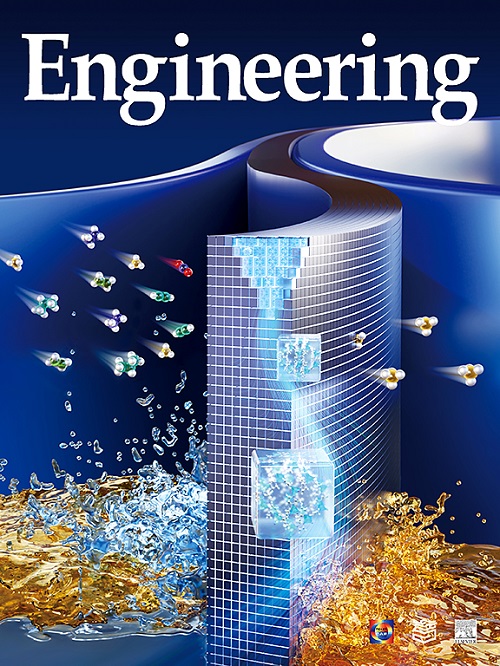A Matthew MXene (Ti3C2Tx) Lamellar Membrane as a Potassium-Sieving Amplifier
IF 10.1
1区 工程技术
Q1 ENGINEERING, MULTIDISCIPLINARY
引用次数: 0
Abstract
Transport channels with ultrahigh K+ selectivity over other ions play a crucial role for living beings, but constructing ionic channels with promising K+ selectivity and permeability remains a challenge. Here, an asymmetric bilayer membrane based on MXene (Ti3C2Tx) lamellar channels consisting of a recognition layer (RL) on top of an enhancement layer (EL) exhibits an amazing Matthew effect: amplification of the preferred transport of K+, resulting in an excellent K+-separation performance. The K+ ion is selected by the 1-aza-18-crown-6 ether-modified RL, owing to preferential affinity energy, and then rapidly transported as a hydrated ion through the EL, based on the confinement effect. Other undesired ions such as Na+ are hindered from entering the RL by the preferred K+ occupation of the crown ether. The MXene (Ti3C2Tx)-based Matthew membrane presents high K+-permeation rates of 0.1–0.2 mol∙m−2∙h−1, with a significant K+/Na+ selectivity of 5–9. The molecular separation mechanism of the Matthew membrane is investigated deeply to explore the nature of the Matthew amplification effect on K+ sieving, where the precise matching of the RL and EL within the membrane governs the fast K+ permeation with good selectivity. The asymmetric structure of our Matthew membrane is the key to understanding the biological function of ion channels for precise and fast ion transport, which will guide us in the creation of artificial ion channels or membranes.
作为钾筛分放大器的 Matthew MXene (Ti3C2Tx) 层状膜
与其他离子相比,具有超高 K+ 选择性的传输通道对生物起着至关重要的作用,但构建具有良好 K+ 选择性和渗透性的离子通道仍是一项挑战。在这里,一种基于 MXene(Ti3C2Tx)层状通道的不对称双层膜展示了惊人的马太效应:放大 K+ 的优先传输,从而实现出色的 K+ 分离性能。由于优先亲和能,1-氮杂-18-冠醚-6 改性的 RL 会选择 K+ 离子,然后基于限制效应,K+ 离子会以水合离子的形式通过 EL 快速传输。冠醚的优先 K+占据阻碍了其他不受欢迎的离子(如 Na+)进入 RL。基于 MXene (Ti3C2Tx) 的马修膜具有 0.1-0.2 mol∙m-2∙h-1 的高 K+渗透率,K+/Na+选择性高达 5-9。深入研究了马修膜的分子分离机理,探讨了马修放大效应对 K+ 筛分的本质,即膜内 RL 和 EL 的精确匹配决定了 K+ 的快速渗透和良好的选择性。马修膜的非对称结构是了解离子通道精确快速离子转运的生物学功能的关键,它将指导我们创建人工离子通道或膜。
本文章由计算机程序翻译,如有差异,请以英文原文为准。
求助全文
约1分钟内获得全文
求助全文
来源期刊

Engineering
Environmental Science-Environmental Engineering
自引率
1.60%
发文量
335
审稿时长
35 days
期刊介绍:
Engineering, an international open-access journal initiated by the Chinese Academy of Engineering (CAE) in 2015, serves as a distinguished platform for disseminating cutting-edge advancements in engineering R&D, sharing major research outputs, and highlighting key achievements worldwide. The journal's objectives encompass reporting progress in engineering science, fostering discussions on hot topics, addressing areas of interest, challenges, and prospects in engineering development, while considering human and environmental well-being and ethics in engineering. It aims to inspire breakthroughs and innovations with profound economic and social significance, propelling them to advanced international standards and transforming them into a new productive force. Ultimately, this endeavor seeks to bring about positive changes globally, benefit humanity, and shape a new future.
 求助内容:
求助内容: 应助结果提醒方式:
应助结果提醒方式:


